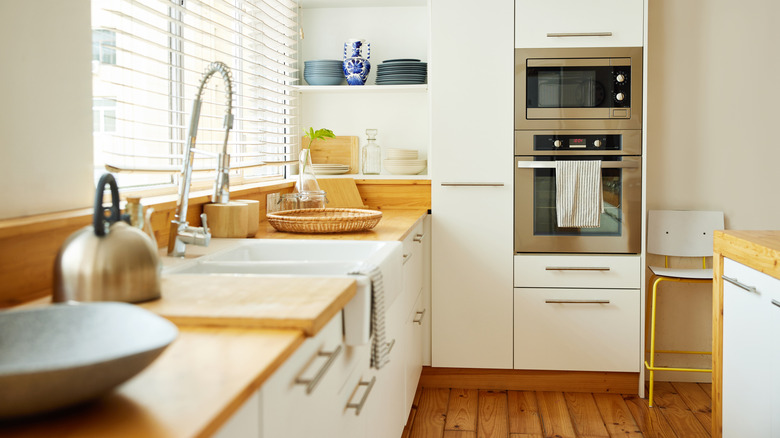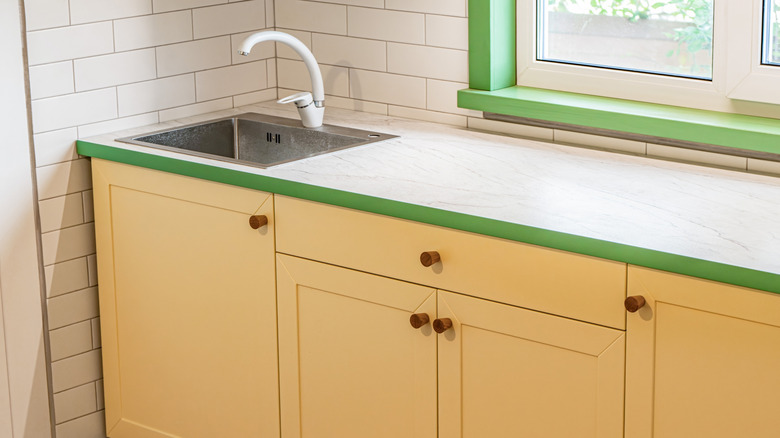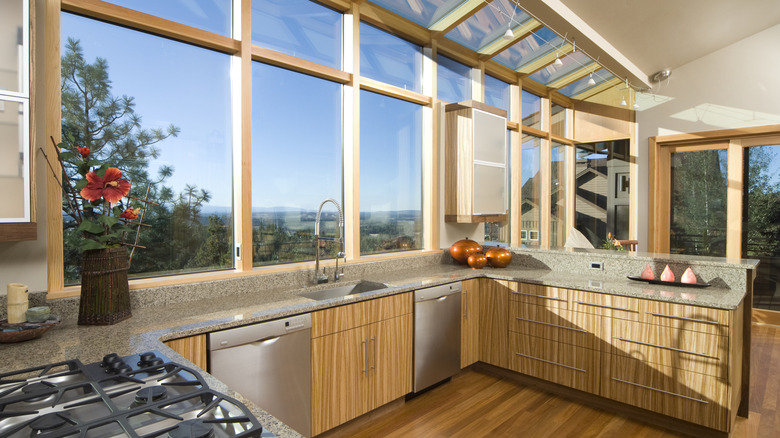Mike Holmes Jr. Sheds Light On The Kitchen Cabinets Material He Avoids At All Costs
Today's homeowners are prioritizing natural materials and eco-friendly products, and searching for green home décor tips to create healthier homes. The increase in awareness about the dangers of microplastics, VOCs, and other toxins have resulted in a surge in demand for sustainability. Creating natural, eco-friendly homes offers benefits for human health and the environment. Some of the reasons people are choosing natural materials include concerns about climate change, toxins in home furnishings and building materials, and indoor air quality.
In an article on his family's Make It Right website, Mike Holmes, Jr. sheds light on the kitchen cabinets material he avoids at all costs, "I prefer to use materials that avoid plastics and PVC (polyvinyl chloride). I suggest looking at cabinets made from natural wood, bamboo, or stainless steel. Avoid vinyl-wrapped or laminate cabinets unless the laminate is eco-friendly." Plastics have become ubiquitous in modern society and are used in a wide range of common household items from toys to furnishings. The overuse of plastics is negatively impacting human health and the environment.
Reasons to avoid plastics and PVC
The overuse of plastics has created a waste management, environmental, and health crisis. Whether you are concerned about the giant plastic garbage patch in the Pacific Ocean, microplastics in food, or breathing in the toxins in building materials and home furnishings, there are many reasons to avoid using plastic in your home. The health risks associated with the toxic chemicals in plastics include cancer, leukemia, and reproductive and developmental problems.
Due to health and environmental concerns, many people have already begun to ditch plastic kitchen items for safer alternatives. Some easy swaps include trading in plastic items for bamboo or hardwood cutting boards, stainless steel or wooden utensils, glass food storage containers, ceramic dishes, and plant-based sponges. When replacing the plastic and toxins in the kitchen, don't overlook the cabinets where you are storing all these new sustainable items.
Polyvinyl chloride (PVC) is among the most commonly manufactured plastics. PVC is toxic at all stages; from the time it is produced until it is disposed of. The PVC production process uses vinyl chloride, which is a well-known carcinogen, and toxic additives known as plasticizers to make the material flexible. These chemicals are known to cause harm to reproductive health, developmental problems, and asthma.
Healthier eco-friendly alternatives
Replacing plastics and PVCs with safe, natural materials is better for the planet and your health. For the same reasons, Mike Holmes Jr. recommends avoiding laminate countertops unless it is eco-friendly. When choosing new kitchen cabinets, natural wood and bamboo are among the best sustainable cabinet materials to use for an eco-friendly impact. Sustainable wood, such as reclaimed and recycled wood are great options for reducing your carbon footprint too.
Bamboo is a fast-growing, sustainable alternative to hardwood because it can be harvested every three to five years. There are several benefits to choosing bamboo for your kitchen cabinets. Bamboo provides the look of wood with less impact on the environment. It is durable, easy to clean, and available in several stain and finish options.
Stainless steel is an excellent choice for kitchen cabinets, which is why it is often used in commercial kitchens. This material is beginning to become more popular in residential homes for several reasons. Stainless steel is sustainable, fire resistant, hygienic, durable, and easy to clean. A variety of finishes are available to provide the versatility needed to work with many different design styles.


